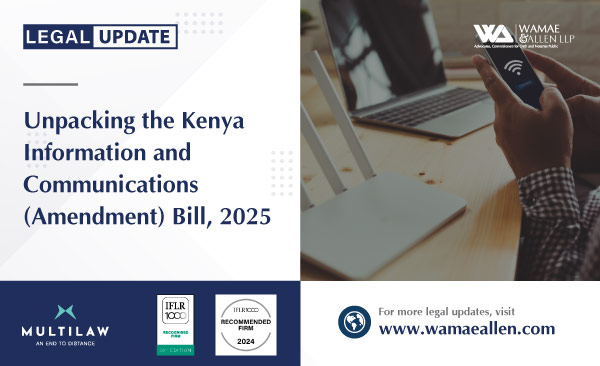Introduction
Aldai Member of Parliament Hon. Marianne Kitany has published a Private Member’s Bill that proposes significant changes to the Kenya Information and Communications Act. Here is what you need to know:
- The bill redefines a telecommunication operator to explicitly include Internet Service Providers (ISPs).
- ISPs will be required to implement metered billing systems that assign unique, traceable internet meter numbers to customers, monitor usage, and generate consumption-based invoices.
- It also requires ISPs to submit detailed subscriber data annually to the Communications Authority of Kenya (CA).
- Additionally, the Bill introduces mandatory age verification for social media users using national IDs to protect children from harmful content.
- Telecom operators must collect extensive personal details: full names, ID numbers, date of birth, and physical address.
Why the Bill is Considered Problematic
- Privacy and Surveillance Concerns
The requirement for ISPs to assign unique meter numbers and submit detailed user data to the regulator enables government surveillance of individuals’ online activities. This raises serious privacy issues, as it allows the state to monitor and potentially control internet usage. Such provisions could lead to abuse of power and infringe on citizens’ right to privacy and freedom of expression, and represent a clear regression from the progress Kenya has made under the Data Protection Act, 2019, and undermine established principles for personal data. - Potential for Government Overreach and Censorship
Mandating metered billing based on consumption could increase costs for consumers and complicate billing for ISPs. It may also limit affordable access to the internet, which is critical for social and economic development. - Age Verification and Social Media Access
The requirement for ISPs to assign unique meter numbers and submit detailed user data to the regulator enables government surveillance of individuals’ online activities. This raises serious privacy issues, as it allows the state to monitor and potentially control internet usage. Such provisions could lead to abuse of power and infringe on citizens’ right to privacy and freedom of expression, and represent a clear regression from the progress Kenya has made under the Data Protection Act, 2019, and undermine established principles for personal data. - Privacy and Surveillance Concerns
While protecting children online is important, requiring all social media users to verify their age using national IDs raises privacy concerns and could limit access to digital platforms. This measure might exclude vulnerable populations who lack official identification or fear data misuse, thus restricting digital inclusion.
CONCLUSION
Without substantial revisions, the bill risks reversing the gains made under the Data Protection Act, 2019.
This article is provided free of charge for information purposes only; it does not constitute legal advice and should be relied on as such. No responsibility for the accuracy and/or correctness of the information and commentary as set in the article should be held without seeking specific legal advice on the subject matter. If you have any query regarding the same, please do not hesitate to contact Data Protection & ICT Department vide WAICTLaw@wamaeallen.com
 Loading...
Loading...
About the author
Charles is an experienced transactional advocate with over 17 years experience in the legal industry. He is the Managing Partner at Wamae and Allen, an Entrepreneur and a proponent of the Adaptability Quotient(AQ) theory.
Flavious is an Associate in the Real Estate and Securitization Department.
She has vast knowledge and hands on experience in Real Estate, Securitization, Banking, Finance, Company Law, Corporate Governance, Insolvency and Commercial Law. She also has keen interest in policy making and emerging legal commercial issues in general.
She is a promising transactional advocate with exemplary interpersonal skills and exudes diligence, integrity, resilience, confidence and great enthusiasm in all her tasks.
-
Flavious Chepkiruihttps://wamaeallen.com/author/flavious-chepkirui/
-
Flavious Chepkiruihttps://wamaeallen.com/author/flavious-chepkirui/












